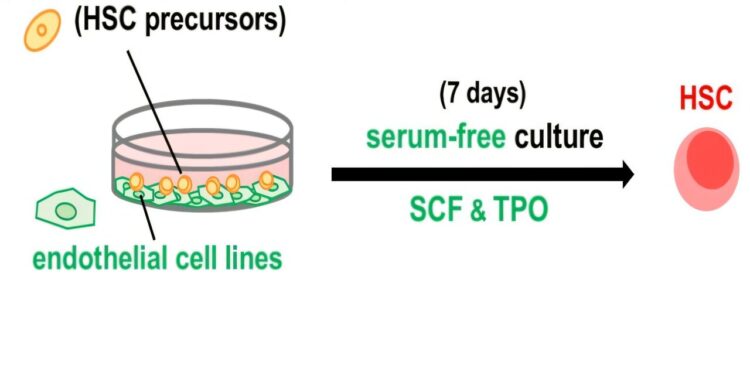This study successfully reproduced the development process of hematopoietic stem cells (HSCs) in an in vitro culture system using commercially available endothelial cell lines as feeder cells, without serum. By adding just two signaling molecules, stem cell factor (SCF) and thrombopoietin (TPO), the researchers were able to induce transplantable HSCs. Credit: Saori Morino-Koga, Minetaro Ogawa, Kumamoto University
Kumamoto University researchers have made notable advances in stem cell biology by replicating the developmental process of hematopoietic stem cells (HSCs) in vitro. This culture system not only improves our understanding of HSC development, but also leads to the development of a new tool that could be instrumental in stem cell therapy and blood disease treatments in the future.
Hematopoietic stem cells (HSCs), the main source of blood cell production throughout life, develop in several stages. The research team, led by Professor Minetaro Ogawa and Assistant Professor Saori Morino-Koga from the Institute of Molecular Embryology and Genetics, discovered that specific signaling molecules are required at each stage of differentiation.
The culture system established in their study replicates the microenvironment in which HSC development occurs and successfully differentiated hemogenic (blood-producing) endothelial cells derived from mouse embryos, which are HSC progenitors, into transplantable HSCs. .
The results are published in the journal Proceedings of the National Academy of Sciences.
Pre-HSCs (HSC progenitors) are stimulated by SCF derived from the endothelium of the dorsal aorta, but not by TPO. After migrating to the fetal liver, pre-HSCs receive both SCF and TPO signals, allowing them to differentiate into mature HSCs. Credit: Saori Morino-Koga, Minetaro Ogawa, Kumamoto University
This culture system is particularly accessible and versatile, as it does not require genetically modified feeder cells or the use of serum that previously limited the scalability and reproducibility of HSC generation.
The researchers used commercially available endothelial cell lines as feeder cells, adding just two signaling molecules: stem cell factor (SCF) and thrombopoietin (TPO). The result was the successful induction of HSCs from embryo-derived hemogenic endothelial cells, demonstrating the effectiveness of the method and its potential for broader applications.
The researchers anticipate that this culture system will provide a powerful tool for further studies into the molecular mechanisms of HSC development. Furthermore, they hope that this will ultimately lead to the induction of HSCs from pluripotent stem cells, such as embryonic stem (ES) cells and induced pluripotent stem (iPS) cells, thereby opening new avenues for therapies based on stem cells for blood diseases.
More information:
Saori Morino-Koga et al, Transition of signal requirements in the development of hematopoietic stem cells from hemogenic endothelial cells, Proceedings of the National Academy of Sciences (2024). DOI: 10.1073/pnas.2404193121
Provided by Kumamoto University
Quote: The team manages to successfully reproduce the development process of hematopoietic stem cells in an in vitro culture system (October 18, 2024) retrieved October 18, 2024 from
This document is subject to copyright. Apart from fair use for private study or research purposes, no part may be reproduced without written permission. The content is provided for informational purposes only.



